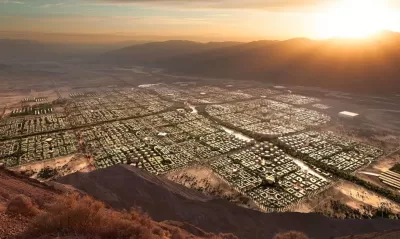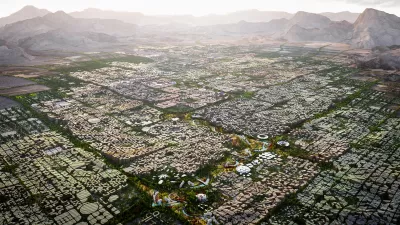Like others before him, e-commerce billionaire Marc Lore wants to build the ideal city from scratch. Urban experts don't have much faith in his chances.

Marc Lore, e-commerce founder and billionaire, has set his sights on planning a utopian community, reports Joshua Brustein. Inspired by the philosophy of 19th century economist Henry George, Lore has "come up with the modest proposal to start a private foundation, buy 200,000 acres or so of land, probably somewhere in the American West, and build a 5 million-person city from the ground up—a Georgist utopia that will serve as a demonstration project for a new, fairer phase of capitalism."
For Lore, the key would be the foundation's commitment "to take the appreciation of the land and give it back to the citizens in the form of medicine, education, affordable housing, social services." The model "mimics the way employees at startups are paid partially in stock. He says he’s planning the city much in the way he’d launch a business."
Lore is taking the project seriously: "[h]e’s hired a team that includes a transportation planner, an engineer, and an urban historian. His real estate consulting firm has narrowed the search for a site down to about six states and has even identified some specific 50,000-plus-acre parcels in Nevada—whose governor has proposed rules to encourage new cities—as potential sites." But despite his wealth, he doesn't have the funding, and he "hasn’t acquired land or water rights, precursors to undertaking the daunting task of persuading people to leave real cities for his hypothetical one," or "figured out how the foundation would operate or persuaded local officials to grant it the power it’d likely need to function."
Sarah Moser, associate professor of geography at Montreal’s McGill University, says the "tradition of trying to improve urban life by starting new cities from scratch" has a long, but largely unsuccessful history. Recent projects tend to have backing from the tech industry, whose "motivations vary from the desire to create test beds for technologies such as autonomous vehicles and citywide networks of sensors, to the Silicon Valley-esque conviction that privately owned startups are the solution to every problem." According to Alain Bertaud, former principal planner at the World Bank, brand new cities fall broadly into three categories: "libertarian attempts to escape government regulation; technocratic areas established to foster and showcase innovations; and projects seeking some novel model of collective welfare."
To Moser, projects like Lore's "are at best a distraction from the boring work of building functional cities—a particular shame at a time when places that already exist are struggling with the pandemic and the growing challenges of climate change. At worst, they end up being vehicles for private interests to extract concessions from local governments desperate for capital that could lead to economic development."
FULL STORY: The Diapers.com Guy Wants to Build a Utopian Megalopolis

Planetizen Federal Action Tracker
A weekly monitor of how Trump’s orders and actions are impacting planners and planning in America.

Congressman Proposes Bill to Rename DC Metro “Trump Train”
The Make Autorail Great Again Act would withhold federal funding to the system until the Washington Metropolitan Area Transit Authority (WMATA), rebrands as the Washington Metropolitan Authority for Greater Access (WMAGA).

The Simple Legislative Tool Transforming Vacant Downtowns
In California, Michigan and Georgia, an easy win is bringing dollars — and delight — back to city centers.

The States Losing Rural Delivery Rooms at an Alarming Pace
In some states, as few as 9% of rural hospitals still deliver babies. As a result, rising pre-term births, no adequate pre-term care and "harrowing" close calls are a growing reality.

The Small South Asian Republic Going all in on EVs
Thanks to one simple policy change less than five years ago, 65% of new cars in this Himalayan country are now electric.

DC Backpedals on Bike Lane Protection, Swaps Barriers for Paint
Citing aesthetic concerns, the city is removing the concrete barriers and flexposts that once separated Arizona Avenue cyclists from motor vehicles.
Urban Design for Planners 1: Software Tools
This six-course series explores essential urban design concepts using open source software and equips planners with the tools they need to participate fully in the urban design process.
Planning for Universal Design
Learn the tools for implementing Universal Design in planning regulations.
Smith Gee Studio
City of Charlotte
City of Camden Redevelopment Agency
City of Astoria
Transportation Research & Education Center (TREC) at Portland State University
US High Speed Rail Association
City of Camden Redevelopment Agency
Municipality of Princeton (NJ)





























